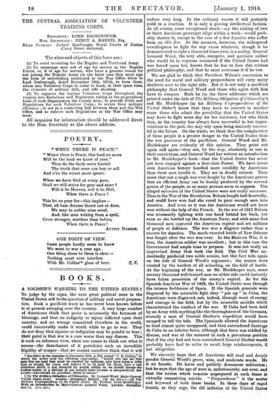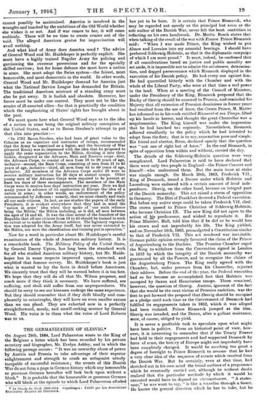BOOKS.
A SOLDIER'S WARNING TO THE UNITED STATES.t To judge by the signs, the next great political lame in the United States will be the question of military and naval prepara- tion. Such a pacificist wave as has never been known before is at present sweeping over the country. A very large number of Americans think that peace is necessarily the foremost of blessings, and that no indignity or injury inflicted upon their country, and no wrongs committed elsewhere in the world, could conceivably make it worth while to go to war. They do not deny that injuries or indignities may be painful to bear ; their point is that war is a cure worse than any disease. This is such an inhuman view, when one comes to think out what it' means—the detachment of it postulates such an incredible frigidity of temper—that we cannot ourselves think that it will • See fetter in the Spectator of December 18th p. 872. signed " J. H. Collins," In which the writer used the following expressions: "Surely you can see that men Ulm me (and they must be couated by millions), who have taken a little beer or whisky for years, and believe it to be good for them, have a real grievance which Ls not removed by people telling as we ahould change the modest habits of a lifetime (I are seventy-four) because a comparatively few people—who should be punished—drink to excess."
f Stalls ef47411seaship. By Leonard Wood, Major-General united Stales Army. Loudon : Humphrey billiard. (Se.. 8d. net.I--(2) The Military Unpreparedness of Me United States. By Frederic Louis Hnldekoper. With as introduction by Major-Cencral Leonard Wood, Londoa: and Co. (176, net) endure very long. In the ordinary course it will probably yield to a reaction. It is only a passing intellectual fashion. At all events, some exceptional shock—say the sinking of two or three American passenger ships within a week—would prob- ably shatter it, except in the case of a few fanatics who suffer from an icicle fire. At the moment, however, the widespread unwillingness to fight for any cause whatever, though it be demonstrated as right a thousand times over, is a reality. General Leonard Wood, the very able, energetic, and patriotic soldier who would be in supreme command if the United States had war forced upon her, knows that he has to face this curious political philosophy, and that he must overcome it if he can.
We are glad to think that President Wilson's conversion to the need for naval and military preparedness will carry many doubters over to the right side. But it is not only a pacificist philosophy that General Wood and those who agree with hind have to conquer. Both he (in the three addresses which are printed under the title of The Military Obligation of C'itizenship and Mr. Huidekoper (in his Military Unpreparedness of the United States2) know that they have to convert in another sense those who admit the possibility that the United States may have to fight some day for- her existence, but who think that, as the country has always been successful in her impro- visations in the past, she may rely upon being similarly success- ful in the future. On the whole, we think that the complacency of these people is a greater danger to the United States than the non possumus of the pacificists. General Wood and Mr. Huidekoper are evidently of this opinion. They point out again and again—they are, by the way, absolutely at one in their convictions, and General Wood has written an introduction to Mr. Huidekoper's book—that the United States has never yet been engaged against a first-class Power. We have never seen American history handled more candidly by Americans than these men handle it. They are in deadly earnest. They insist that not a single war ever fought by the Americans proves that an efficient Army can be hastily produced by the natural genius of the. people, as so many persons seem to suppose. The alleged successes of the United States were not really successes. Thus in the War of the Revolution Britain fought half-heartedly, and could have won had she cared to pour enough men into America. And even as it was the Americans would not have won without the help of the French. In the war of 1812 Britain was necessarily fighting with one hand behind her back, yet even so she bottled up the American Navy, and •with some five thousand men captured the American capital and set millions of people at defiance. The war was a -disgrace rather than a success for- America. The much-vaunted battle of New Orleans was fought after the war was over. In the Mexican War, it is true, the American soldier was excellent ; but in this case the Government had ample time to prepare. It was not really an improvised Army that took the field. The Civil War un- doubtedly produced two noble armies, but this' fact tells again on the side of General Wood's argument ; the armies were created by the hardest of all schooling, on the field of battle. At the beginning of the war, as Mr. Huidekoper says, some seventy thousand well-trained men on either side could instantly have taken possession of the enemy's capital. As for the Spanish-American War of 1898, the United States won through the intense feebleness of Spain. If the Spanish generals were disgraced by the miserable fight they " put up " in Cuba, the Americans were disgraced, not, indeed, through want of energy and courage in the field, but by the miserable muddle which characterized the conduct of the war. If Cuba had been held by an Army with anything like the thoroughness of the Germans, scarcely a man of General Shafter's expedition would have escaped to tell the tale. The Spaniards allowed the Americans to land almost quite unopposed, and then surrendered Santiago de Cuba to an inferior force, although that force was riddled by disease, and was at the moment in such a precarious position that if the city had not been surrendered General Shafter woeld probably have had to retire to await large reinforcements, it not altogether.
We sincerely hope that all Americans will read and deeply ponder General Wood's grave, wise, and moderate words. He is no fanatic. He hates and publicly denounces militarism ; but he says that the age of wars is, unfortunately, not over, and that the nation which remains unprepared in such times iA virtually committing suicide. " Preparedness " is the motto and keyword of both these books. In these days of rapid transit, as they urge, the old isolation of the United States
cannot possibly be maintained. America is involved in the. wrangles and touched by the ambitions of the Old World whether she wishes it or not. And if war conies to her, it will come suddenly. There will be no time to create armies out of the void. The alleged American genius for improvisation will avail nothing.
And what kind of Army does America need ? The advice of General Wood and Mr. Huidekoper is perfectly explicit. She must have a highly trained Regular Army for policing and garrisoning the overseas possessions and for the specially skilled services ; but for home defence she must have a nation in arms. She must adopt the Swiss system—the fairest, most honourable, and most democratic in the world. In other words, General Wood and Mr. Haidekoper demand for America just what the National Service League has demanded for Britain. The traditional American mistrust of a standing army must also be put away. It is foolish and obsolete. Moreover, her forces must be under one control. They must not be like the armies of ill-assorted allies—for that is practically the condition which the emphasizing of States' rights has brought about in the past.
We must quote here what General Wood says as to the idea of a nation in arms being the original military conception of the United States, and as to Baron Steuben's attempt to put that idea into practice :— " In 1792 Baron Steuben, who had been of great value to the Colonies as an organizer and instructor of troops, recommended that the Army be organized as a legion, and the Secretary of War (General Knox) was so impressed with the idea that he proposed to apply the same organization to the Militia, dividing it into three bodies, designated as the Advance, Main and Reserve corps—first, the Advance Corps, to consist of men from 18 to 20 years of age, inclusive—second, the Main Corps, consisting of men from 21 to 45 years of age, inclusive—third, all men from 45 to GO years of age, inclusive. All members of the Advance Corps under 20 were to receive military instruction for 30 days at annual camps. Other young men of the Advance Corps were required to be present at least ten days of these encampments. The members of the Main Corps were to receive four days' instruction per year. Here we find many years in advance of its application in Europe the idea of a nation in arms ; in other words, an endorsement of the policy recommended by Jefferson : namely, that we mast classify and train all our male citizens. In fact, as one studies the papers of the early Presidents, it is evident everywhere that they had in mind the ' nation in arms' idea when they spoke of our main reliance being the Militia,' the Militia including, as it did, all men between the ages of 18 and 45. It was the clear intent of the founders of the Republic that all our citizens from 18 to 45 should be trained to such an extent as to make them efficient soldiers. The legionary organiza- tion was adopted for the Army itself, but was never extended to the Militia, nor were the classification and training put in operation."
Now for a word in particular about Mr. Huidekoper's careful examination of the whole of American military history. It is a remarkable book. The Military Policy of the United States, by General Emory Upton, has long been the standard work -for all who studied American military history, but Mr. Huide-
koper has in some respects improved upon, corrected, and amplified that famous survey. Mr. Huidekoper's book is just what is wanted to lay the facts in detail before Americans. We sincerely trust that they will be warned before it is too late.
We hope that they will do all that Mr. Wilson proposes, and much more if they think it necessary. We have suffered, are suffering, and shall still suffer from our_ unpreparedness. We
should be sorry to see our kinsmen undergo the same experience. But they should remember that if they drift blindly and com-
placently to catastrophe, they will have an even smaller excuse than we can plead. They are exhorted now in a perfectly straightforward, manly, and unself-seeking manner by General Wood. His voice is to them what the voice of Lord Roberta was to us,











































 Previous page
Previous page